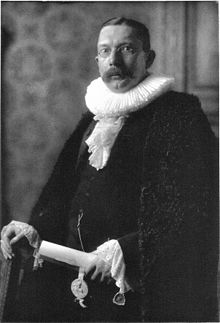Anton Hagedorn
Anton Bernhard Carl Hagedorn (born April 23, 1856 in Lübeck , † May 29, 1932 in Hamburg ) was a German historian and state councilor .
Live and act
Anton Hagedorn was the son of a civil servant who worked for the Lübeck-Büchener Railway . After visiting the Lübeck Katharineum , which he graduated from high school at Easter 1876, he studied theology at the University of Erlangen from the summer semester of 1876 . In Erlangen he became a member of the Bubenreuth fraternity that same year . He switched to studying history and from 1877 assisted Leopold von Ranke in Berlin. At that time von Ranke dealt with the work of world history and a representation of the Roman republic and the imperial era.
In 1880 he received his doctorate at the University of Göttingen on the constitutional history of the city of Magdeburg at the time of the unbroken rule of the Moritzstift (until 1192) and then received a position in the archive of the Hanseatic city of Lübeck . Hagedorn became an employee of the Hanseatic History Association , on whose behalf he was to collect documents for the continuation of the Hanseatic document book. For this reason, the archivist visited various archives at home and abroad over a longer period of time. In November 1885 he received a position as Senate Secretary and in this position supervised the Senate Chancellery and several commissions of the Senate.
In the spring of 1891 Otto Beneke died , who among other things headed the Senate Archives in Hamburg . Anton Hagedorn moved to Hamburg in March 1891 as Benecke's successor. Here he took over the position of the State Council and headed the Senate Chancellery and the State Archives. Hagedorn mainly dealt with the relocation of the archive to the Hamburg city hall . He also reorganized the archive. Hagedorn saw the involvement of scientific staff as a central task of the institution and tried to promote scientific work. He was also committed to improving administration. During his service, he succeeded in significantly increasing the number of employees. Hans Nirrnheim , with whom Hagedorn worked closely, described Hagedorn's organizational skills as his main strength.
In addition to working in the Senate Archives, Hagedorn attended meetings of the Hamburg Senate and gave lectures for various areas of administration. He was also the (co-) editor of the Hamburg and Hanseatic document books and published on Hamburg's territorial policy and the history of the press in Hamburg. He was accepted into the Freemasons' Union in 1880 and was Grand Master of the Great Lodge of Hamburg from 1919 to 1927 . Hagedorn retired at the end of 1923.
Anton Hagedorn was married to Helene Marie Friederike, née Krahnstöver.
literature
- Hans Wilhelm Eckardt: Hagedorn, Anton . In: Franklin Kopitzsch, Dirk Brietzke (Hrsg.): Hamburgische Biographie . tape 4 . Wallstein, Göttingen 2008, ISBN 978-3-8353-0229-7 , pp. 128-129 .
- Helge Dvorak: Biographical Lexicon of the German Burschenschaft. Volume 1: Politicians. Sub-Volume 2: F-H. Winter, Heidelberg 1999, ISBN 3-8253-0809-X , pp. 219-220.
Web links
Individual evidence
- ^ Hermann Genzken: The Abitur graduates of the Katharineum zu Lübeck (grammar school and secondary school) from Easter 1807 to 1907. Borchers, Lübeck 1907. (Supplement to the school program 1907): Digitized , No. 749
- ↑ Harald Lönnecker: "The topic was and remained without parallel appearance in German historical research": the Burschenschaftliche Historische Kommission (BHK) and the Society for Burschenschaftliche Geschichtsforschung eV (GfbG) (1898 / 1909-2009); a history of people, institutions and science. (Representations and sources on the history of the German unity movement in the 19th and 20th centuries 18) Heidelberg: Winter 2009 ISBN 9783825356729 , p. 96
| personal data | |
|---|---|
| SURNAME | Hawthorn, Anton |
| ALTERNATIVE NAMES | Hagedorn, Anton Bernhard Carl |
| BRIEF DESCRIPTION | German historian and State Councilor |
| DATE OF BIRTH | April 23, 1856 |
| PLACE OF BIRTH | Lübeck |
| DATE OF DEATH | May 29, 1932 |
| Place of death | Hamburg |
